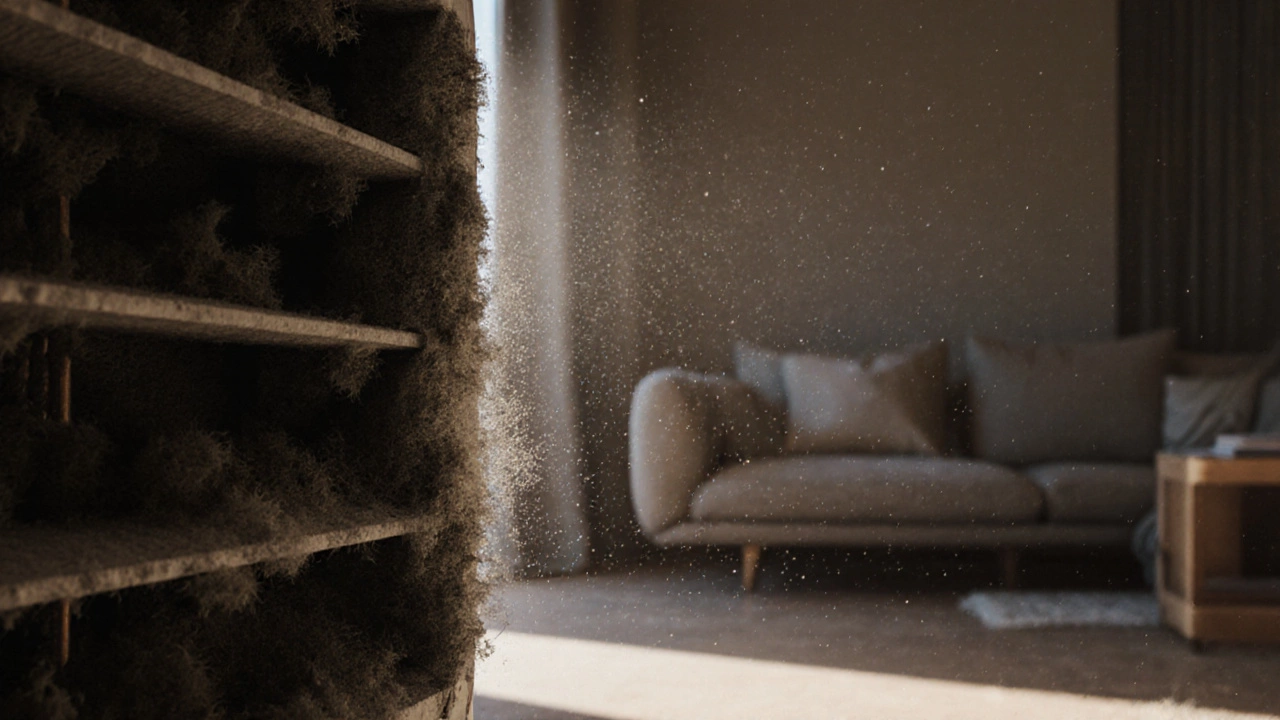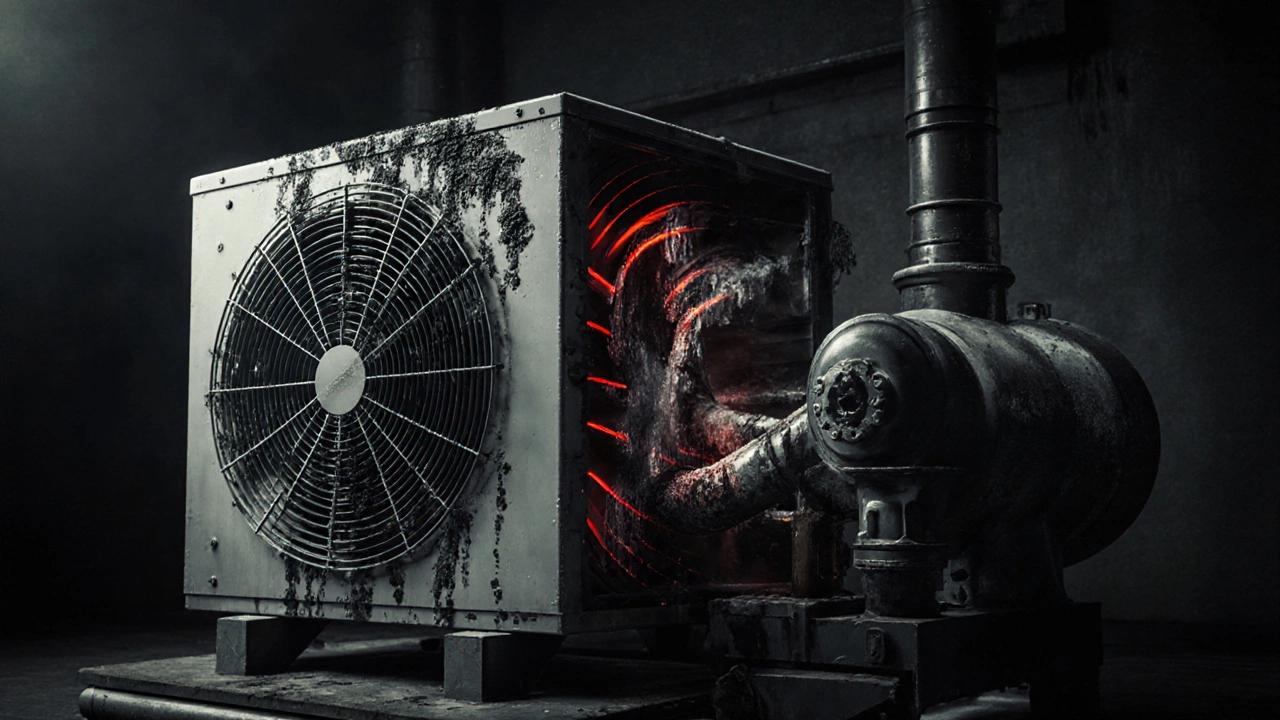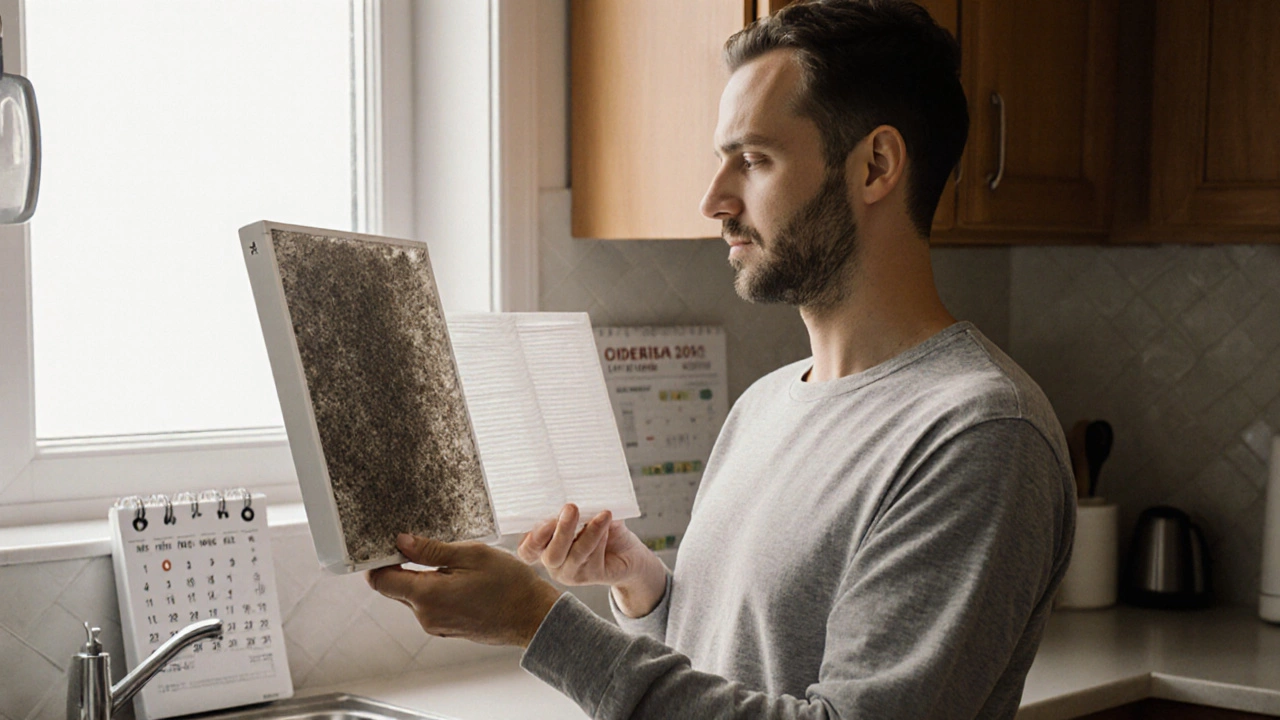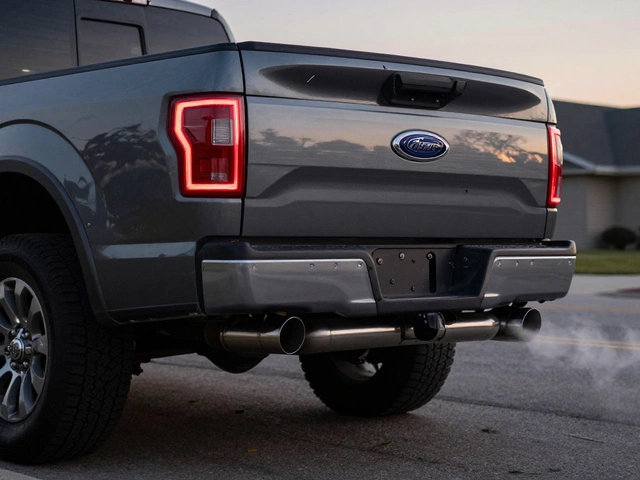
AC Filter Energy Savings Calculator
Your AC filter is one of the most important maintenance points for your system. A clogged filter increases energy use by up to 15% and can cause costly repairs. This calculator shows your potential savings from regular filter changes.
Potential Savings
Changing your filter regularly could save you up to £0.00 per year. This is based on:
- Your current filter condition
- Average daily usage
- Your electricity rate
Did you know? A severely clogged filter can increase energy use by up to 15%. This calculator shows how much money you're losing because you skipped filter changes.
Most people don’t think about their AC air filter until the system starts making weird noises or the bills spike. But skipping filter changes isn’t just lazy-it’s expensive, unhealthy, and hard on your equipment. If you haven’t changed your AC air filter in six months, or worse, a year, here’s exactly what’s happening inside your system right now.
Your air conditioner is working harder than it should
A clean air filter lets air flow smoothly through your system. A dirty one? It’s like trying to breathe through a sock. The blower motor has to spin faster and longer to pull the same amount of air through the clogged filter. That extra strain doesn’t just waste electricity-it shortens the life of the motor. In fact, a 2023 study by the U.S. Department of Energy found that a severely clogged filter can increase energy use by up to 15%. In Bristol, where winters are damp and summers get humid, your AC runs more often than you think. That means every blocked filter adds pounds to your winter heating bill and your summer cooling bill.
Dust and allergens are circulating in your home
Your air filter isn’t just there to protect the machine-it’s your first line of defense against dust, pollen, pet dander, and mold spores. When the filter is full, it can’t catch anything anymore. Instead, those particles get sucked right back into your living space. If you’ve noticed more sneezing, itchy eyes, or stuffy noses since last winter, your filter might be the culprit. People with asthma or allergies see a noticeable drop in symptoms within days of replacing a neglected filter. One homeowner in Clifton reported her child’s nighttime coughing stopped completely after swapping out a filter that hadn’t been changed in 18 months.
Your ductwork is getting dirty too
When the filter can’t hold back the gunk, the dust doesn’t just float around your room-it builds up inside your ducts. Over time, that layer of grime gets thick enough to restrict airflow even more. Cleaning ducts costs £300-£500. Replacing a filter? £10-£25. And if you’ve got a central system with multiple vents, that dust doesn’t just sit there. It can harbor mold, especially in damp areas like underfloor ducts in older Bristol homes. Once mold takes root in the ducts, even a new filter won’t fix it. You’ll need professional remediation.
The evaporator coil freezes up
This is one of the most common-and avoidable-AC failures. When airflow is restricted, the cold refrigerant inside the evaporator coil doesn’t get enough warm air passing over it. That causes the coil to drop below freezing. Moisture in the air turns to ice on the coil. Soon, the whole thing is covered in a block of ice. Your AC stops cooling. Water leaks from the unit. And if you keep running it, the ice can crack the coil or flood your home. A frozen coil isn’t just inconvenient-it’s expensive to repair. Replacing a damaged evaporator coil can cost £800-£1,500. A new filter? £15.

Your compressor is at risk
The compressor is the heart of your AC. It’s the part that pumps refrigerant and costs more than most other components combined. When airflow is poor, the system can’t release heat properly. That forces the compressor to overheat. Repeated overheating wears out the internal bearings and seals. In extreme cases, it causes total compressor failure. Replacing a compressor in a split system can cost upwards of £2,000. That’s more than half the price of a new AC unit. And most warranties won’t cover it if the damage is linked to poor maintenance.
You’ll pay more for repairs-and possibly a new system
Think of your AC like a car. If you skip oil changes, you’re asking for engine trouble. Same here. A dirty filter doesn’t just cause one problem-it triggers a chain reaction. One homeowner in Totterdown replaced his filter after a technician diagnosed a frozen coil. The tech told him the compressor was already showing signs of stress from years of poor airflow. He ended up replacing the whole system six months later. He could’ve avoided it all with six filter changes at £12 each.
How often should you really change it?
There’s no one-size-fits-all answer, but here’s what works in practice:
- Every 30 days: If you have pets, smoke indoors, live near a busy road, or have allergies.
- Every 60-90 days: For average homes with no pets or smokers.
- Every 6 months: Only if you use a high-efficiency filter (like MERV 13) and your system runs very little.
Check your filter monthly. Hold it up to the light. If you can’t see through it, it’s time to replace it. No need to wait for a calendar date. The filter tells you when it’s full.

What filter should you buy?
Not all filters are created equal. The most common types:
- fiberglass (MERV 1-4): Cheap, disposable, barely filters anything. Only use if you’re on a tight budget and have no health concerns.
- PLEAT (MERV 8-11): Best for most homes. Catches dust, pollen, and mold. Doesn’t restrict airflow. Costs £8-£15.
- High-efficiency (MERV 13-16): Great for allergies or asthma. But only if your system is designed for it. Older units can’t handle the resistance. Check your manual.
Never go higher than your system’s max rating. A MERV 16 filter in a 10-year-old unit? That’s a recipe for a frozen coil.
What if you forgot to change it?
If you’ve gone over a year without changing it, don’t panic-but don’t ignore it either. Replace the filter immediately. Then:
- Turn off the AC and let the system rest for 2-3 hours.
- Check for ice on the outdoor unit or inside the air handler.
- Look for water pooling near the unit or on the floor.
- If you smell mustiness or see dust blowing from vents, call a technician.
Most systems recover fine after a filter change. But if the AC still doesn’t cool properly, or the air smells bad, you’ve got a bigger issue. Don’t delay-call someone before the compressor gives out.
Pro tip: Set a reminder
Put a calendar alert on your phone for the first day of every three months. Or stick a note on your breaker box. One woman in Bedminster sets her phone to remind her every April, July, October, and January. She’s never had a repair. That’s the kind of habit that saves hundreds-and keeps your family breathing cleaner air.





